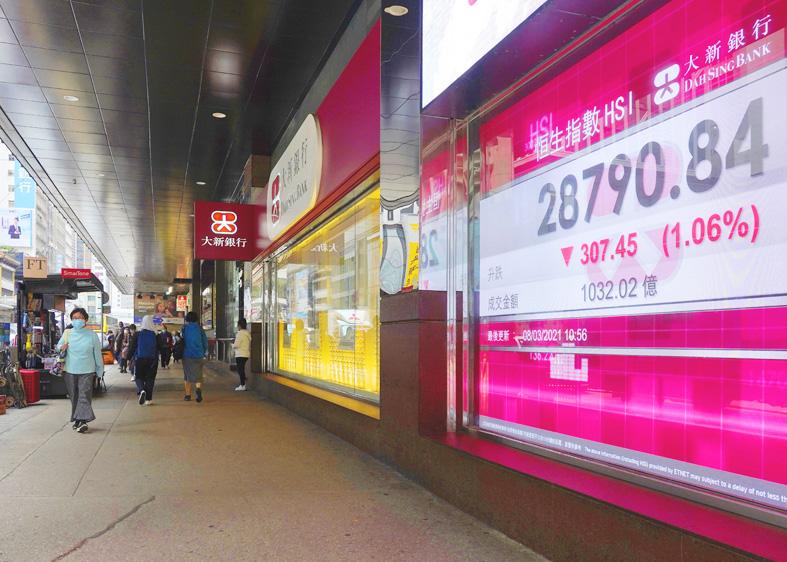Hong Kong stock listings this year could surpass last year’s pace, driven by an influx of new economy companies and a “homecoming” of Chinese firms, the head of listings at the territory’s exchange said.
“We are only into March, but from what I see in the pipeline, we will be as busy if not more busy this year,” Hong Kong Exchanges & Clearing Ltd’s head of listing Bonnie Chan (陳翊庭) said in a Bloomberg Television interview yesterday.
Hong Kong is in the midst of a surge in listing, with initial public offerings (IPOs) continuing at a fast clip after reaching a decade-high last year. The bourse has seen an influx of big Chinese technology companies, which have sold shares in the territory in part to supplement New York listings amid tension between the US and China.

Photo: AP
Listings so far this year have reached almost US$10 billion, after US$52 billion in deals last year.
In the meantime, stocks are in the midst of a sell-off amid global jitters about rising interest rates. Hong Kong’s benchmark Hang Seng Index has slid 6 percent from last month.
“The theme will be more or less the same,” Chan said. “We are certainly seeing a lot of interests from new economy companies, especially biotech companies, and the homecoming trend continues.”
Chan also said the bourse is studying allowing special-purpose acquisition companies to list in Hong Kong, but that it needs to be “mindful” of investor protections.
“What we want to do is to obviously study the commercial viability and the attractiveness in order to maintain Hong Kong as an attractive market, competitive market,” she said.
A recently proposed hike in Hong Kong’s stamp duty on stock trades has not materially reduced trading volume in the territory, she said.

Taiwan will prioritize the development of silicon photonics by taking advantage of its strength in the semiconductor industry to build another shield to protect the local economy, National Development Council (NDC) Minister Paul Liu (劉鏡清) said yesterday. Speaking at a meeting of the legislature’s Economics Committee, Liu said Taiwan already has the artificial intelligence (AI) industry as a shield, after the semiconductor industry, to safeguard the country, and is looking at new unique fields to build more economic shields. While Taiwan will further strengthen its existing shields, over the longer term, the country is determined to focus on such potential segments as

UNCERTAINTY: Innolux activated a stringent supply chain management mechanism, as it did during the COVID-19 pandemic, to ensure optimal inventory levels for customers Flat-panel display makers AUO Corp (友達) and Innolux Corp (群創) yesterday said that about 12 to 20 percent of their display business is at risk of potential US tariffs and that they would relocate production or shipment destinations to mitigate the levies’ effects. US tariffs would have a direct impact of US$200 million on AUO’s revenue, company chairman Paul Peng (彭雙浪) told reporters on the sidelines of the Touch Taiwan trade show in Taipei yesterday. That would make up about 12 percent of the company’s overall revenue. To cope with the tariff uncertainty, AUO plans to allocate its production to manufacturing facilities in

COLLABORATION: Given Taiwan’s key position in global supply chains, the US firm is discussing strategies with local partners and clients to deal with global uncertainties Advanced Micro Devices Inc (AMD) yesterday said it is meeting with local ecosystem partners, including Taiwan Semiconductor Manufacturing Co (TSMC, 台積電), to discuss strategies, including long-term manufacturing, to navigate uncertainties such as US tariffs, as Taiwan occupies an important position in global supply chains. AMD chief executive officer Lisa Su (蘇姿丰) told reporters that Taiwan is an important part of the chip designer’s ecosystem and she is discussing with partners and customers in Taiwan to forge strong collaborations on different areas during this critical period. AMD has just become the first artificial-intelligence (AI) server chip customer of TSMC to utilize its advanced

While China’s leaders use their economic and political might to fight US President Donald Trump’s trade war “to the end,” its army of social media soldiers are embarking on a more humorous campaign online. Trump’s tariff blitz has seen Washington and Beijing impose eye-watering duties on imports from the other, fanning a standoff between the economic superpowers that has sparked global recession fears and sent markets into a tailspin. Trump says his policy is a response to years of being “ripped off” by other countries and aims to bring manufacturing to the US, forcing companies to employ US workers. However, China’s online warriors